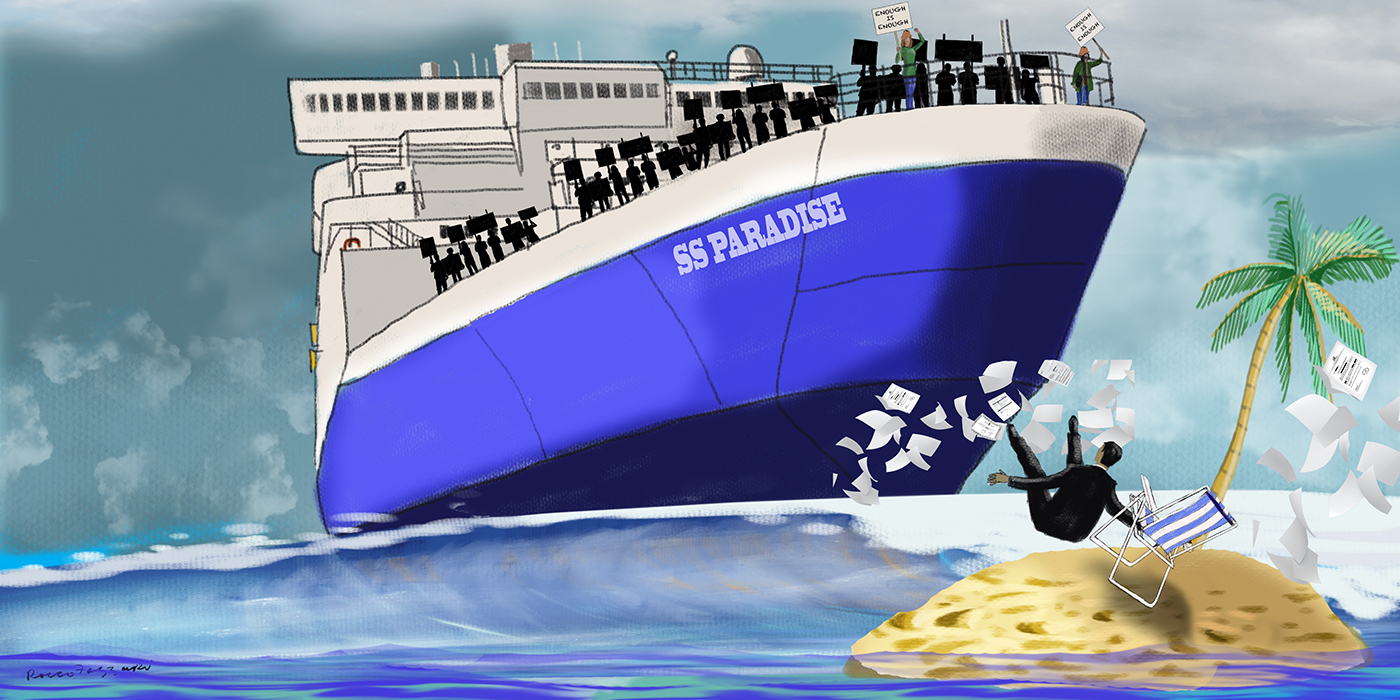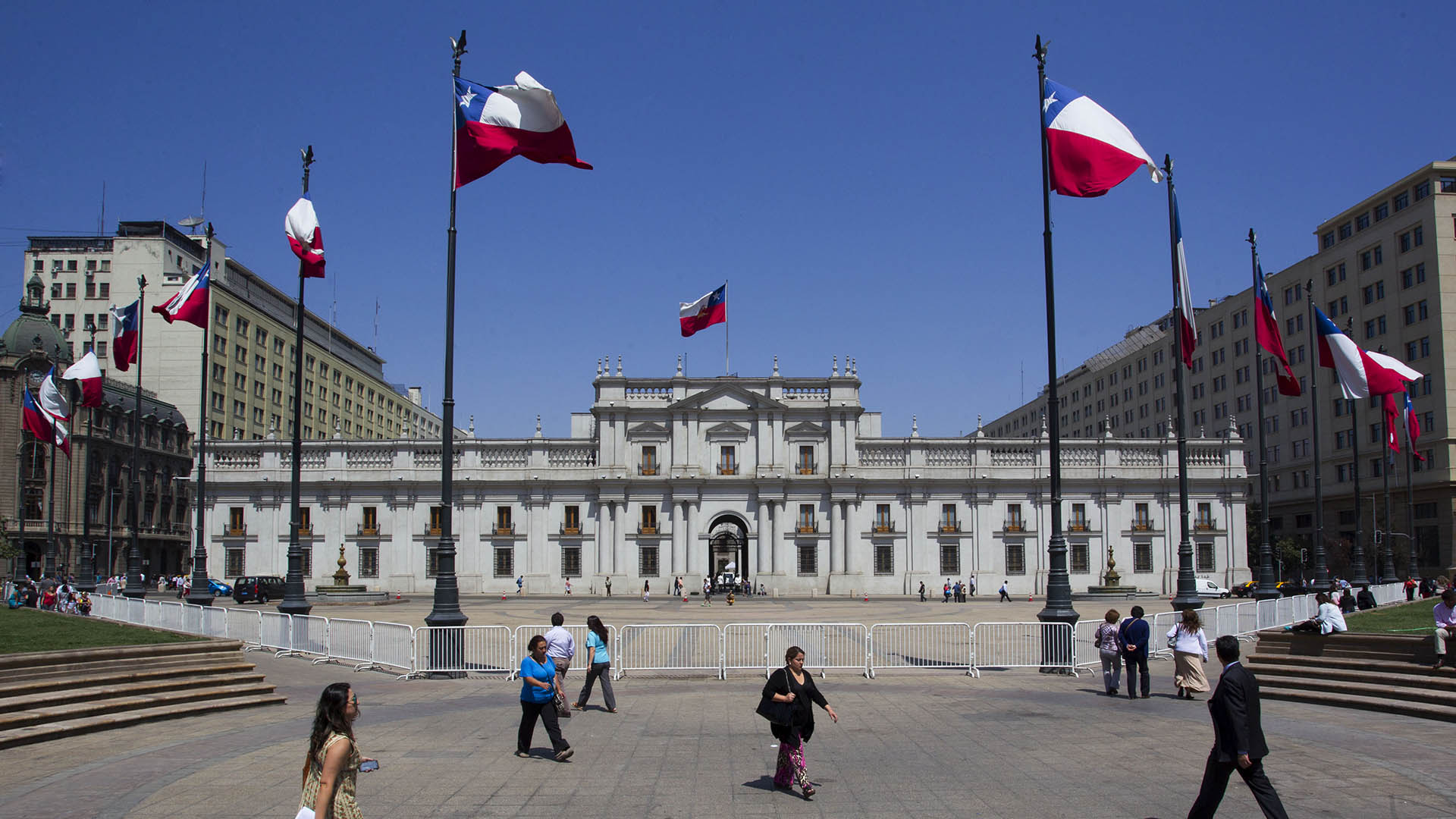The “Paradise Papers,” the latest in a series of global journalistic exposés of the offshore financial industry, has triggered tax-related investigations by governments around the world — from the Netherlands to Vietnam to New Zealand.
Based on yet another mass data leak, the Paradise Papers sparked new or expanded criminal investigations in Switzerland and Argentina, accelerated sweeping reforms by the European Union, triggered a wave of audits in India and South Korea and sparked political uproar in Turkey and Angola.
Apple Inc., the tech giant and global symbol of corporate tax avoidance with a staggering $252 billion offshore, will face renewed scrutiny from Margrethe Vestager, the European Union’s competition commissioner.
Some reformers believe a long-awaited global crackdown on a rogue system is finally at hand.
“With this, the secrecy of tax havens and transactions done through them have been smashed,” India’s finance minister, Arun Jaitley, told The Indian Express. He said publication of the Paradise Papers “shows that nothing remains a secret.”
If only …
But no one should be fooled.
The offshore industry is a sprawling behemoth so secretive its very size can only be guessed and yet understood to be so large as to distort the global economy. A conservative estimate finds that at least $8.7 trillion, 11.5 percent of the world’s wealth, is hidden offshore, diverting billions from strapped national governments to the accounts of powerful corporations and individuals. They, in turn, use their power to further rig the global tax game at the expense of everyone else.
About 63 percent of U.S. multinationals’ foreign profits are held offshore, the main reason that effective U.S. corporate tax rates were already relatively low before the new tax law lowered them further. About 10 percent of Europe’s total wealth is now offshore, along with almost one-third of Africa’s and fully half of Russia’s.

The Paradise Papers project was made possible by a leak of more than 13 million documents — the bulk of them from an elite offshore law firm, Appleby — to Süddeutsche Zeitung. The documents were shared with the International Consortium of Investigative Journalists and more than 90 global media partners.
What, in fact, the Paradise Papers confirmed in sobering detail is the extent to which the offshore industry has outgrown its origins on the margins of the financial system. It is much more than a string of shadowy operations like the Mossack Fonseca law firm, the focal point of the blockbuster 2016 Panama Papers exposé.
Epithets like “marginal” and “rogue” don’t apply to Appleby, which has been named “Offshore Law Firm of the Year” more than once and is a member of the “Offshore Magic Circle,” an informal collection of leading offshore law firms. Its clients include princesses, prime ministers and Hollywood stars, as well as corporate giants: Apple, Nike, Facebook and Glencore, the world’s biggest commodities trader.
The Paradise Papers documents reveal that Appleby’s collaborators have included the law firms Baker McKenzie and Akin Gump Strauss Hauer & Feld; the accounting giants KPMG, Ernst & Young and PricewaterhouseCoopers; and the global money-center banks Citigroup, Bank of America, HSBC, Credit Suisse and Wells Fargo.
Luke Harding, a Guardian reporter and a partner on both the Panama Papers and Paradise Papers, observed in 2016 that the offshore world was once thought to be a shadowy, but minor, part of our economic system. Now we know: “It is the economic system,” he said.
As big it was, even the Panama Papers, at 2.6 terabytes the largest data leak ever handed to journalists, uncovering of thousands of shell companies, offered a peek at perhaps 5 percent of that slice of that particular offshore market, which itself is only part of sprawling and multifaceted shadow financial system, the economist and offshoring authority Gabriel Zucman told Alan Rusbridger in an interview for The New York Review of Books.
“Even if you have gigabytes of data,” Zucman said, “since they only involve one particular firm in one particular country that’s involved in one particular form of tax haven activity, there’s no way to make meaningful inference from that as to what’s the scale of the global problem, the magnitude of tax avoidance and tax evasion, the costs for governments.”
The Paradise Papers — the sixth in a series of investigations in which the ICIJ and its partners used mass data to examine offshore-related matters — advances public knowledge to yet another level. But, as Zucman noted, Switzerland alone reported $2.4 trillion in assets managed by Swiss banks for foreigners, about 60 percent of that in shell companies.
U.S. individuals, by Zucman’s estimate, “are evading $30 billion a year [in taxes] through unreported offshore assets,” while U.S. multinational companies are avoiding $120 billion “by artificially shifting profits to Bermuda and similar places.”
And then, Zucman said, “there’s the whole banking aspect to it — you know, bankers in Switzerland and Luxembourg and everywhere who are creating shell companies, or trusts, or foundations, and so on; or who are actively helping some of their clients to hide assets; who are investing their funds on their behalf, and so on and so on.”
If one defining characteristic of democracy is that everyone plays by the same rules, then democracy is in trouble all over the world.
#OùEstApple ? Petite surprise en chanson devant l’apple Store de Jersey#ParadisePapers#ApplePayYourTaxes#ApplePayetesImpôts pic.twitter.com/hfGYzpfSRX
— Attac France (@attac_fr) December 16, 2017
Impact of the Paradise Papers
Is there no hope?
On Dec. 16, more than two dozen French protesters, carrying magnifying glasses and wearing Sherlock-Holmes-style deerstalker hats, landed on the Isle of Jersey and headed for the only place on the island authorized to sell iPhones.
“Apple, Apple, Apple, pay your taxes!” they chanted.
The anti-globalization movement, Attac, had arrived to conduct a satirical “investigation” into whether the tech behemoth actually did corporate business in the well-known tax haven — a fair question since billions of dollars of the iPhone-maker’s profits are booked there.
The protesters found that Apple had no visible presence on the island beyond the solitary Apple store.
Two weeks before, other Attac protesters stormed an Apple store in central Paris, handcuffing themselves to balustrades and forming conga lines as they chanted demands that the company pay $15 billion in taxes.
If global efforts to reign in the offshore system have gained momentum, rising public awareness has been a key factor.
In the six weeks after public disclosure of the Paradise Papers, Facebook users had viewed posts about the project a staggering 182 million times. Some of the widely read and distributed posters biggest influencers were politicians – U.S. Sen. Bernie Sanders, the Vermont independent, for example. The reach spanned countries and continents, with some of the most active online interaction coming in France, India and Mexico.
For a few hours on Nov. 6, a day after publication of the first Paradise Papers news stories, Google searches for “Paradise Papers” outnumbered even those for “Donald Trump.”
Social media users called for boycotts of major companies and institutions named in the Paradise Papers, including Apple and Nike, another corporate giant that has shifted billions of dollars in profits between tax havens to avoid taxes in Europe.
On Twitter, people liked or retweeted content related to the Paradise Papers more than 1.5 million times. Top posts came from Sanders, U.K. opposition leader Jeremy Corbyn, actor Mark Ruffalo and other celebrities.
“Leak day is my favorite day. #ParadisePapers,” Edward Snowden tweeted on Nov. 5. The post was retweeted more than 6,000 times and “liked” more than 11,500.
‘It’s called cheating’
But the vast majority of social media responses came from average people moved enough to speak up.
“Of course tax havens are ‘morally wrong’ — it’s called cheating,” Holly Boruck, posted on Facebook from California in a typical response.
Another person asked, “When are they going to change the law so these tax evaders either serve time or pay their fair share like most Americans who may be facing prison time for their small amounts of unpaid taxes?”
Got to love Glasgow.. #paradisepapers #TaxAvoidance #glasgow #woodlands #scotland #peoplemakeglasgow #offshore pic.twitter.com/XSAYo3IOAk
— Iain Hall (@iainhall92) November 17, 2017
Students marched in the streets in the U.K. and held meetings in the U.S. to protest their universities’ offshore investments, which, as the Paradise Papers revealed, included the use of “blocker” corporations to avoid taxes on endowments.
“This is kind of ridiculous,” Kari Barclay, a 23-year-old Stanford University PhD candidate and student council member, remembered some members saying during a council meeting. “People didn’t expect to see Stanford’s name among corporations and wealth folks in the Papers,” Barclay said.
The council called for the university to divest its holdings in offshore companies.
In Quebec, protesters waved flags and banners in front of Parliament to protest tax evasion, and in Glasgow, Scotland, an artist commandeered a roundabout to set up an exhibit complete with inflatable palm trees, play money and a washing machine. A sign above the installation read, “The Offshore Paradise Bank.”
The offshore industry, once invisible to all but a few specialists, has become a topic of public discourse.
“The Paradise Papers show the magnitude of the exploitation,” the San Francisco Chronicle declared in an editorial. “It’s a maddening reality for the rest of us who pay our fair share of the cost of public services.”
South Africa’s Business Day — remarking that tens of billions of dollars were likely sitting, undeclared, outside the country — said in an editorial: “The clear lesson for policy makers … is that we need astute, fair and competent tax authorities to tackle the complexities of global tax shopping effectively and ensure the public purse receives what is due to it.”
These tax evaders not only undermine the economy and the system which makes their profits possible, but the very principle of globalization.
And Handelsblatt Global made the point that offshore schemes hurt the very idea that capital should be allowed to flow freely. “These tax evaders not only undermine the economy and the system which makes their profits possible, but the very principle of globalization,” wrote Jan Hildebrand, a Handelsblatt editor. “And the particularly cruel irony is that many of the US president’s closest associates, who campaigned against globalization to secure his election victory, were themselves named in the Paradise Papers.”
A legacy of empire
The offshore system’s historical roots are deeper than commonly supposed.
Journalist and author Nicholas Shaxson traces them to the postwar collapse of the British Empire and the transformation of former island colonies — Bermuda, the British Virgin Islands, the Cayman Islands — into British Overseas Territories, which, like the U.K. itself, embraced the role of financial intermediary. “By the end of 1959, about $200 million was on deposit abroad,” Rusbridger wrote. “By 1961, the total had hit $3 billion”. Jurisdictions around the world began to compete for offshore money, and a financial race to the bottom began.
Financial deregulation of the Reagan and Thatcher years supercharged the process, and the “offshore” industry soon expanded in some U.S. states, Ireland and other developed jurisdictions. A small cadre of support professionals became a global industry folded into dedicated practice areas of megabanks and major law and accounting firms.
The financial crisis of 2008, for all the misery it caused, helped to expose the offshore industry. Facing plummeting tax revenues, governments were forced to turn to an obvious source: tax evaders and avoiders. In 2010, the U.S. enacted the landmark 2010 Foreign Account Tax Compliance Act, forcing foreign banks to hand over data on their U.S. clients or face a 30 percent tax on U.S. bank transactions.
The G-20 group of nations and the Organization for Economic Co-operation and Development began working on transparency and information-sharing measures that in 2014 evolved into the the global Common Reporting Standard, or CRS. This automated information exchange, while wonky, could have far-reaching effects on individual countries’ efforts to locate and tax assets held in other jurisdictions.
So far, more than 100 countries have committed to implementing the system, although critics point to loopholes that give countries broad discretion in deciding which countries can receive their data. Switzerland has been singled out as being particularly unforthcoming.
An offshore drumbeat
International reform efforts have been accompanied by a series of global journalistic exposés based on unprecedented mass data leaks from well-placed professional-services firms in the offshore sector. Each has caused a public outcry that has kept the heat on international reform efforts, experts say.
In April 2013, ICIJ and 40 media partners published an exposé based on leaked documents from firms in Singapore and the British Virgin Islands that specialized in creating discrete wealth-management tools. “Secrecy for Sale” was the first of ICIJ’s investigations of the hidden financial dealings of politicians, con artists and the mega-rich around the world.
In 2014, “Luxembourg Leaks,” based on 28,000 pages of leaked records, revealed confidential deals between the government of Luxembourg and some of the world’s largest corporations, agreements that granted, in some cases, effective tax rates below 1 percent. In 2015, “Swiss Leaks” exposed how HSBC’s private bank in Switzerland aided tax evasion and hid millions of dollars in corrupt proceeds for clients.
Then came the Panama Papers. Based on more than 11.5 million files leaked from Mossack Fonseca, the investigation exposed the law firm’s history of providing secretive companies and tax-evasion vehicles for scores of politicians, criminals, billionaires and celebrities. The project led to arrests, prosecutions and resignations, including the resignations of the prime ministers of Iceland and Pakistan.
Sixteen countries have collected a total of $554.5 million in penalties and unpaid taxes through Panama Papers-related investigations, according to a survey of ICIJ media partners. Mexico’s tax authority, for instance, recovered $52 million, Oscar Molina Chie, head of the Large Taxpayers’ Unit, told ICIJ’s Mexican media partner, Proceso.
The Canada Revenue Agency said it audited 136 taxpayers and recovered nearly $15 million because of “Secrecy for Sale,” and audited 300 taxpayers, recovering $39 million, because of “Swiss Leaks.” The agency reported that 123 Canadians are undergoing audits triggered by Panama Papers revelations and that several related criminal investigations are in progress. The Paradise Papers will probably bear fruit in four to seven years, the agency predicted.
Beyond the statistics, the Panama Papers propelled offshoring and tax evasion onto the public agenda globally — and then the Paradise Papers gave it another boost.
“I think it’s the first time that there is public outrage on such a scale,” Zucman told Rusbridger in the New York Review interview. “At the global level people felt very strongly that something is wrong.”
Reform efforts get another push
This month, during a session that ended at 2 a.m., the European Parliament voted to require all European countries to publish the names of all companies’ true owners. The anti-money-laundering measure, which EU countries have 18 months to add to their domestic laws, also represents a breakthrough in the global fight against secrecy and tax avoidance.
The law was passed despite opposition from the U.K., Ireland, Luxembourg and other states that act as tax havens or tolerate them. It also sets a new standard for laggards, including the United States, which continues to tolerate high levels of secrecy in Nevada, Delaware and elsewhere.
Roberto Gualtieri, chairman of the Parliament’s economic and monetary affairs committee, said revelations by investigative journalists made the difference between this year’s effort and those of years’ past. “I remember how tough it was,” said Gualtieri, of Italy.
The EU also accelerated the adoption of a long-promised “blacklist” of tax havens. While the list fell short some advocates’ expectations – it left off European countries and popular Caribbean havens under British control – reformers said it was a start.
There is no reason for the very existence of these offshore paradises.
Since publication of the Paradise Papers, governments opened tax investigations in Vietnam, Lithuania, Indonesia, Ireland, Greece, the Netherlands, New Zealand, Australia, Nigeria and Pakistan. South Korea’s National Tax Service said it is probing 37 citizens and companies.Recently, Indian authorities sent the first set of summonses to 23 “groups” named in the Paradise Papers.
Antonio Gustavo Gomez, attorney general of Tucuman Province, Argentina, said the Paradise Papers exposed offshore companies related to Minera Alumbrera, a copper and gold company operated by commodity giant Glencore. His office is probing alleged pollution, tax evasion and money laundering, according to a letter his office sent to ICIJ.
Separately, Argentine lawmakers filed a complaint against Finance Minister Luis Caputo alleging crimes that included failing to disclose his offshore interests and breaching his duties as a public official.
In the Netherlands, the secretary of state for finance announced a review of 4,000 agreements between corporations and the national tax office after two ICIJ media partners, the newspapers Trouw and Financieele Dagblad, revealed that rules had been breached in issuing a $169 million tax break for consumer-products giant Procter & Gamble.
In the US, a tug of war
But the ultimate battle over the future of the offshore system will be fought in the U.S., which remains a financial hegemon through its control over access to the US financial system — a life-or-death matter for any jurisdiction or institution with a stake in international finance. Plus, in Nevada, Delaware and elsewhere, it remains a tax haven itself.
Democratic lawmakers called for an investigation into President Donald Trump’s commerce secretary, Wilbur Ross, after the Paradise Papers revealed Ross’s ties to influential Russian business interests. Ross held a stake, through a complex chain of Cayman Islands firms, in a shipping company that earned millions of dollars from an energy company co-owned by members of Russian President Vladimir Putin’s inner circle, including his son-in-law.
“Secretary Ross’ financial disclosures are like a Russian nesting doll, with blatant conflicts of interest carefully hidden within seemingly innocuous holding companies,” said Sen. Richard Blumenthal, a Connecticut Democrat and member of the committee that confirmed Ross as secretary in January.

A Commerce Department spokesman said this month that Ross had divested himself of shares in the shipping company, Navigator Holdings Ltd. The department’s inspector general and the Government Accountability Office, an investigative arm of Congress, told ICIJ that they are reviewing the requests for investigations.
ICIJ’s investigation thrust Apple’s tax practices into the public eye just as Apple was poised to become the biggest beneficiary of then-proposed legislation that included tax cuts for U.S. multinationals with foreign profits parked offshore.
After ICIJ published details of Apple’s tax arrangements, Republicans in Congress increased to 15.5 percent, from 10 percent, the bill’s proposed tax rate on overseas cash profits brought home to the U.S. The existing rate at the time was 35 percent, and the reduction was promoted as an incentive to multinational corporations to repatriate profits.
The measured was signed into law this month by Trump.
On one hand, the company would have to pay billions of dollars more than had previously been proposed to bring home all its overseas cash. On the other, the law still has a huge tax benefit for Apple.
And so it goes.
As Nobel Prize-winning economist Joseph Stiglitz noted in a recent speech, the question isn’t about specific features of the offshore system. It’s whether the offshore system serves any legitimate purpose at all or simply allows the rich and powerful to flout rules followed by everyone else.
“The reality is that they put their money there in order to engage in either tax avoidance, tax evasion, regulatory avoidance, regulatory evasion,” Stiglitz said.
“There is no reason for the very existence of these offshore paradises.”







